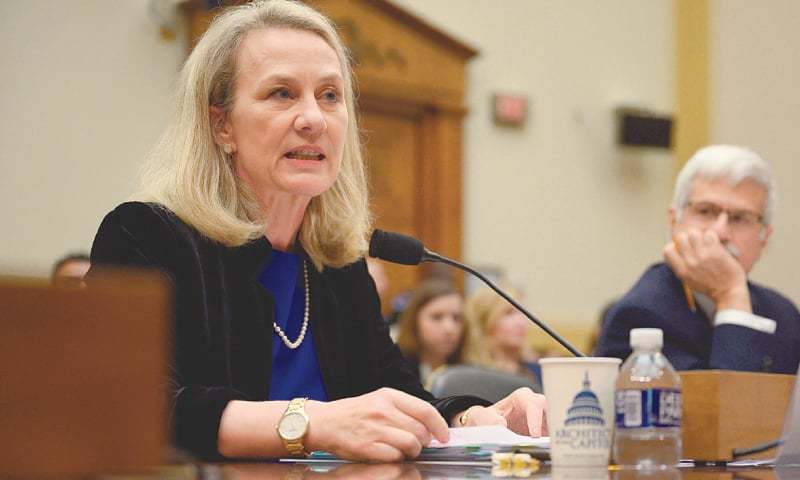US sending 15 trade delegations to Pakistan next year: Wells

WASHINGTON: The United States plans to send 15 trade delegations to Pakistan next year to explore possibilities for expanding trade with the country, says Assistant Secretary of State Alice Wells.
The information is included in a paper Ms Wells read at a Washington think-tank, Wilson Centre, last week, which focused heavily on the China-Pakistan Economic Corridor (CPEC), but it also included various suggestions for expanding US-Pakistan trade ties.
The paper, now posted at the US State Department’s official site, says that the US Commerce Department has “already stepped up its activity in Pakistan with 15 trade delegations planned for the next year”.
And once the new expanded Development Finance Corporation (DFC) is up and running, “Pakistan is going to be a country of great interest”.
According to the paper, the DFC will have more than double the investment cap than the Overseas Private Investment Corporation (OPIC), increasing from $29 billion to $60bn. OPIC is a US government agency which mobilises private capital for overseas investments.
Document suggests US-Pakistan ties are going to expand
The paper argues that doubling the cap would enable investment in projects that have high standards and are financially sustainable over the long haul.
While urging Pakistan to benefit from these additional US resources, Ms Wells reminded Islamabad last week that “true sustainable development is really a marathon and not a sprint. It requires the development of effective regulatory framework, strong rule of law, fiscal health, and an enabling business climate”.
She recalled that during Prime Minister Imran Khan’s visit to the United States in July, President Donald Trump was “extremely enthusiastic about the potential for increasing and expanding our US-Pakistan trade and investment relationship. And both our governments are working very hard to find practical ways to do that. We commend Pakistan for surging 28 slots on the World Bank’s 2020 Ease of Doing Business ranking and being highlighted as one of the top ten reformers globally,” she added.
The paper also highlights some commercial connections between the United States and Pakistan such as, the US firm Excelerate is prepared to potentially invest more than $300 million to upgrade a floating storage regasification unit in Pakistan’s first LNG terminal.
ExxonMobil has been working to support Pakistan’s ambitious effort to access new LNG supplies.
Over the last five years PepsiCo has invested $800m to expand its infrastructure and diversify products, and Coca-Cola has invested $500m in the last couple of years, providing thousands of jobs for Pakistanis.
Uber Technologies entered the Pakistani market in 2016 and currently operates across nine cities, providing employment opportunities for thousands of Pakistanis.
The paper argues that US corporate social models are outstanding vehicles that create jobs and opportunities for communities associated with these foreign investments.
So, the US-Pakistan Women’s Council, for instance, fosters cooperation between American and private sector, Pakistani private sector, to mentor women and girls. Another American brand, KFC, supports the education of children with hearing disabilities and other underprivileged young people, partnering with schools throughout Pakistan.
Proctor & Gamble’s Children’s Safe Drinking Water Programme has provided 875m litres of clean drinking water to Pakistani communities in need.
Noting that US companies bring superior quality and technology, the paper points out that Pakistani leaders often praise US companies like Cargill and Corteva, that are passing critical technology and driving “enormous productivity gains in Pakistan’s huge agricultural sector”.
The US has also helped establish some of Pakistan’s most prestigious educational institutions and centres including Lums, IBA, JPMC and the Centre for Advanced Studies in Energy at Nust.
“And just to be crystal clear, the US-Pakistan development partnership has primarily taken the form of grants — not loans,” said Ms Wells while adding that such links “offer a sense of the direction that we envision”.
Published in Dawn, November 28th, 2019













































